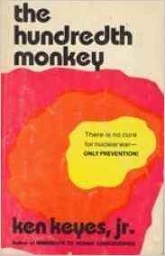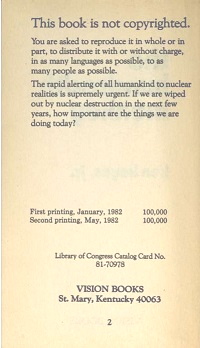Home Shortcuts
About Me Shortcuts
Personal Shortcuts
Rants Shortcuts
Sitemap Shortcuts
Other Shortcuts
Hundredth Human.com
A Story about a Regular Guy and His Irregular Thoughts
As the story goes...
The Japanese monkey, Macaca Fuscata, had been observed in the wild for more than sixty years. In 1952, on the island of Koshima, scientists began observing a tribe of these monkeys who were given sweet potatoes that had been dropped in the sand. The scientists observed that the monkeys liked the taste of the sweet potatoes but did not like the taste of the sand. One day, an 18 month old male named Imo realized he could solve the problem by washing the sweet potatoes in a nearby stream before eating them. He taught this trick to his playmates, who all taught it to their playmates, who taught it to their families. Over the next several years, this cultural innovation was gradually learned and adopted by various monkeys in the tribe as the scientists observed them. By 1958, all of the young monkeys in the tribe had learned to wash the sandy sweet potatoes to make them taste better. Adult monkeys who imitated their children also learned this new social behavior. However, the other adult monkeys kept eating the dirty sweet potatoes.
In the autumn of that year, a certain number of Koshima monkeys had learned to wash their sweet potatoes before eating them. The exact number is not known, but let's suppose, when the sun rose one morning, ninety-nine monkeys on Koshima Island had learned to do it. Let's further suppose later that morning the hundredth monkey learned to wash sweet potatoes.
THEN IT HAPPENED!

By that evening, all of the monkeys in the tribe were washing their sweet potatoes before eating them. The added energy of the hundredth monkey brought about an ideological breakthrough.
But notice...
The most surprising thing observed by the scientists was that tribes of monkeys on other islands, on the mainland, and even on other continents began washing their sweet potatoes.
Although the exact number varies, the Hundredth Monkey Phenomenon posits that, when only a limited number of people adopt a new awareness, it remains in the consciousness of only those people, but when a certain critical number adopts the new awareness, it can be communicated from mind to mind.
The story of the Hundredth Monkey is purely fictional, but it is a fascinating concept nonetheless. It was first published in 1975 by Lyall Watson, but it did not become well known until Ken Reyes, Jr. published his book The Hundredth Monkey in 1982, at a time when the nuclear armament build up between the United States and the former USSR reached its peak. In his book, Keyes warned that the world was in danger of being destroyed by nuclear war. Keyes used the story of the Hundredth Monkey as an inspirational parable, applying it to humans to raise conscious awareness of the destructive effects of nuclear war to the critical number that would allow it to be communicated from mind to mind. The story of the Hundredth Monkey serves as a reminder of the critical importance of sharing what we know, passing on our knowledge to others so they may learn and grow from it. Holding onto knowledge is a fruitless endeavor that doesn't do anyone any good. It is only when we share what we know and learn what others know that we can grow as a society. We must always be open to learning new ways and be willing to teach our ways to others. By doing so, we strengthen the field that allows new awarenesses to be picked up by everyone, thereby making all of us the Hundredth Human.
Keyes Jr, Ken (1982). The Hundredth Monkey St. Mary, KY: Vision Books

Keyes did not copyright his book. Instead, on the copyright page, he encourages his readers to reproduce and distribute the book as much as they want. This may seem unusual, but the reason for the lack of copyright has to do with the reason he published the book. In 1982, the nuclear arms race was at its most dangerous since the Cuban Missile Crisis. As the United States sought to develop the Strategic Defense Initiative, an anti-ballistic missile system based in outer space, many people feared the world was getting closer to the point that the arms race would develop into a military conflict in which both countries would use nuclear weapons. Keyes published his book in order to raise the conscious awareness of nuclear weapons and their destructive power, and he uses the Hundredth Monkey Phenomenon as an inspriational parable, presenting it as a mechanism for bringing about positive social change. He speaks directly to the reader, "Your awareness is needed in saving the world from nuclear war. You may furnish the added conscious energy to create the shared awareness of the urgent necessity to rapidly achieve a nuclear-free world." When viewed in this light, it makes sense that he would publish his book without a copyright. He was simply practicing what he was preaching.


The design of this webpage is based on a template by Alpha Studio
